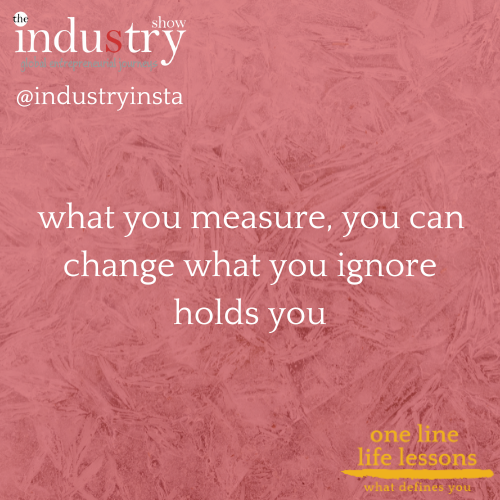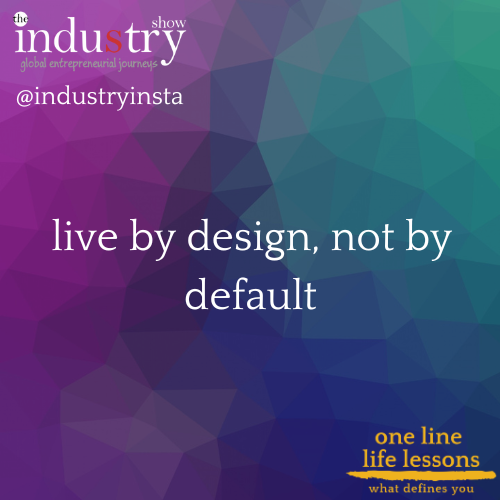Sep 13, 2025
Lalitha
Ramamoorthy
Lalitha Ramamoorthy is the CEO of Hikigai – a health AI platform transforming care by making it globally equitable and deeply personalized for every individual. Also, she is a registered dietician, health coach and founding director of School of World Music & Dance.
One Line Life Lessons from Lalitha



Episode Highlights
- Nitin Bajaj welcomes Lalitha Ramamoorthy, Lalitha Ramamoorthy, to the show (00:00).
- Lalitha Ramamoorthy is the founder and CEO of Hikigai (00:21). She’s a lifelong learner who believes dance rehearsals offer great leadership training. Her journey began as a wellness coach and nutritionist (00:21). She’s endlessly curious about people and tech (00:53).
- Nitin Bajaj asks about Hikigai (01:18).
- Lalitha Ramamoorthy says Hikigai comes from the Japanese philosophy of purpose, tailored to health (01:29). It reimagines healthcare using AI to handle paperwork for clinicians (01:41). The platform captures and structures clinical conversations in real time. It automates coding and supports decisions (02:01). For clinicians, this means less paperwork and less burnout (02:24). For patients, it means more proactive, personalized healthcare (02:30).
- Nitin Bajaj asks why she started Hikigai (02:41).
- Lalitha Ramamoorthy says it was a mix of frustration and hope (02:44). Healthcare is often reactive. AI can scale prevention and personalization (02:48). Everyone’s health story is unique (03:12). Hikigai creates a digital twin, giving a 360-degree view of the patient (03:23). The goal? Build something doctors trust, patients understand, and even her parents can make sense of (03:46).
- Nitin Bajaj asks about Hikigai’s impact and vision (04:03).
- Lalitha Ramamoorthy says pilots are ongoing in India and North America (04:19). They’ve already touched a thousand lives via collaboration with a university in India (04:37). They are building a large language model for the demographics of India. The company has a strong B2B2C pipeline and growing revenue (05:08).
- Nitin Bajaj congratulates Lalitha Ramamoorthy on her success (05:19).
- Nitin Bajaj asks about the biggest challenge in healthcare (05:41).
- Lalitha Ramamoorthy says it’s convincing physicians that AI aids their workflow (05:55). Preventive care is slower to show results, and clinicians are pressed for time (06:15). They meet this challenge with trusted data and seamless integration (06:22).
- Nitin Bajaj notes the importance of having industry experts on the team (06:53).
- Lalitha Ramamoorthy agrees (07:14).
- Nitin Bajaj asks about the most exciting opportunity (07:43).
- Lalitha Ramamoorthy says it’s predictive AI for longevity scoring (07:50). It offers a sneak peek into future health (08:05). The future of healthcare is dynamic, personal, and anticipatory (08:21).
- Nitin Bajaj agrees that personalized medicine needs to be more accessible (08:35).
- Nitin Bajaj asks about past disappointments and successes (09:13).
- Lalitha Ramamoorthy says scaling too quickly in India didn’t work due to fragmented digitalization (09:31). Market readiness matters (10:13). They switched to North America and are growing steadily (10:25).
- Nitin Bajaj asks how Lalitha Ramamoorthy de-stresses (10:56).
- Lalitha Ramamoorthy dances. She runs a nonprofit teaching music and dance (11:07).
- Nitin Bajaj asks for a book or podcast recommendation (11:48).
- Lalitha Ramamoorthy recommends “Icky Guy” and “Deep Medicine” by Eric Topol (11:55). She also recommends the Heyiguy Studios podcast (12:32).
- Nitin Bajaj asks for life lessons (12:47).
- Lalitha Ramamoorthy shares three lessons: health is first, what you measure you can change, and live by design, not by default (12:55).
- Nitin Bajaj thanks Lalitha Ramamoorthy for sharing her story and lessons (13:30).
Show Transcript
Transcript - Full Episode
[00:00:00 – 00:00:09] Nitin Bajaj
Hey, everyone. Welcome to the industry show. I’m your host, Nitin Bajaj, and joining me today is Lalitha Ramamoorthy. Lalita, welcome on the show.
[00:00:09 – 00:00:13] Lalitha Ramamoorthy
Thank you, Nitin. It’s a pleasure to be here and looking forward to a fun conversation.
[00:00:14 – 00:00:19] Nitin Bajaj
It’s great to have you here and I’m looking forward to it as well. Let’s start with the big question. Who is Lalita?
[00:00:21 – 00:01:06] Lalitha Ramamoorthy
That’s a very good question to start off with and it’s a great way to break the ice too. So to the listeners, Lalitha Ramamoorthy today is a founder and CEO of Hikigai and in life, lifelong learner and someone who still believes that dance rehearsals are definitely the best leadership training. My journey started as a wellness coach and a nutritionist, and it’s evolved to where it is today into building a company at the intersection of healthcare and AI. And at my core, I am extremely and endlessly a curious person. Curious about people, curious about technology, curious about how we live not just longer, but live better.
[00:01:07 – 00:01:28] Nitin Bajaj
Amazing. And curiosity is a trait we share a lot in common. And with that, I have the official title, I guess, to ask you a bunch of questions. Right. So tell us about Hikigai and more importantly, why start it and how did you go about it?
[00:01:29 – 00:02:35] Lalitha Ramamoorthy
At its heart, as the name suggests, has evolved from the Japanese philosophy of Ike gai, which is the purpose of life. But we have tailored it more to the purpose of health. And it’s our attempt to reimagine healthcare or on a whole. And we use AI as where it takes off the paperwork for clinicians, the desk job of them documenting so patients finally get all their care, and ultimately that care feels more personal. Our platform is looking to capture and structure clinical conversations in real time, ambient documentation, automate coding, trusted decision supports, and also make it a very seamless operation across EHR systems. So if anything else, our platform is an extension of any clinic, but never a disruption of any clinic. For clinicians, that means lesser paperwork, lesser burnout, which is an actual thing that’s happening today.
For patients, it means more proactive, personalized healthcare.
[00:02:36 – 00:02:42] Nitin Bajaj
Amazing. You could have done so many different things as you have in your career. Why do this?
[00:02:44 – 00:04:02] Lalitha Ramamoorthy
Honestly, Nitin, it was a mix of frustration and hope. Frustration to begin with was because healthcare is often reactive. As we see, especially in our country, people fall through the cracks. And it is really the hope that because AI can finally scale prevention and personalization in ways we’ve never seen it before. So we’re going to grab that opportunity in my wellness Work it. I’ve realized that the one size fits all is never something that I wanted and everyone’s health story is unique. So that’s really brought us to the core of why we built Hikigai.
Where you are creating the digital twin and bringing that personalization where you get a 360 view of the patient on a whole, be it the social, the economic, the mental, the physical, physical and the emotional well being. All of that taken into consideration and put together in that one single platform. Yes. So my goal is very simple, or our goal is very simple. We want to build something where the doctors trust patients understand and even my parents can make sense out of it. And no, I’m not running a hospital, but this is a AI platform.
[00:04:02 – 00:04:17] Nitin Bajaj
That’s amazing. Now I know this is a relatively new journey that you all are on. What’s the impact so far, but also in the near term, what is the vision?
[00:04:19 – 00:05:19] Lalitha Ramamoorthy
Yeah, you’re right about the fact that we’re still crawling and getting our walk straight in terms of being in the market, we’re still a young startup, but globally the pilots are already ongoing in India and in North America and early traction is also happening hopefully in other parts of the globe. And we’ve already touched a thousand lives because of the fact that we’ve got a very good collaboration with the university in India where we are building a large language model exclusively for the demographics of India. And anytime when you’re touching that part of the world, you’re talking bigger numbers. So certainly we’re taking baby steps one at a time, but the impact has been pretty eventful. And we’re small, but we are mighty. That’s a startup with a passport, a strong B2B B2B 2C pipeline. And revenue is growing as we speak and also with high retention enterprises, partnerships.
And we’re hoping that we’re soon in the market to be recognized as one of its kind.
[00:05:19 – 00:05:24] Nitin Bajaj
That’s amazing. And congratulations again on all of your successes so far in such a short time.
[00:05:24 – 00:05:25] Lalitha Ramamoorthy
Thank you.
[00:05:25 – 00:05:39] Nitin Bajaj
Not only validates the need for what you’re building, but also shows the team you put together is on the money and is able to drive that positive outcomes for the constituents you’re looking to serve. Congratulations.
[00:05:39 – 00:05:40] Lalitha Ramamoorthy
Thank you very much, Nitin.
[00:05:41 – 00:05:54] Nitin Bajaj
Now, healthcare is a pretty messy space to say the least. Amongst the many challenges that you come across, what’s the one big one that you would like to call out?
[00:05:55 – 00:06:52] Lalitha Ramamoorthy
Yeah, you said it. So right. Amongst the many challenges, I would say the number one is convincing physicians and healthcare professionals that AI doesn’t disrupt their workflow. It’s an extension of their workflow and it’s going to make it more optimized and seamless for them if anything else. And preventive care is slower to show results and clinicians are already pressed for time. So we meet this head heads on with trusted clinical data, seamless workflow integration, storytelling that positions us as allies and not as disruptors. So that’s the challenge that we are facing and we’re definitely handling it one at a time.
We’re alongside with the the doctors. We’re also providing them that hand holding where we tell them that whatever we promise is what we deliver. That’s an important challenge that we’re definitely solving slowly.
[00:06:53 – 00:07:13] Nitin Bajaj
And it helps that you have people from the industry that are part of the founding team, so you know that you’re being mindful and respectful of their expertise, their professions, but also in a way where you come across as something that is going to aid and bring in efficiencies to the work they’re doing. It’s extremely important.
[00:07:14 – 00:07:37] Lalitha Ramamoorthy
Absolutely, yes. Especially with having somebody on board who’s a physician himself in the advisory board that really gave us an upper hand. And also having a product manager who also has the health care background and needless to say, my background being in health care, all of that’s summated to bringing a better product that is more precise and available to what the health care really requires today.
[00:07:39 – 00:07:49] Nitin Bajaj
That’s smart and amazing. Not surprising given you’re involved in all of this now. Now, on the flip side of challenges come opportunities. What’s the most exciting one that’s ahead of you?
[00:07:50 – 00:08:34] Lalitha Ramamoorthy
The most exciting frontier, I should say, is predictive AI for longevity scoring. That is certainly a very exciting opportunity and we’re looking forward to grabbing it and utilizing it as efficiently as possible. Think of it as personalized sneak peek into the report card showing future health, showing the risks before they appear in the labs as symptoms. The this is why we are part of the Gemba League pushing precision medicine to scale. And the future of healthcare isn’t one size fits all. It’s dynamic, it’s personal and it’s anticipatory. So this is really an exciting phase and we’re looking forward to achieving that one step at a time.
[00:08:35 – 00:09:01] Nitin Bajaj
I agree personalized medicine has been a bit of a talk, but has, I believe, only been available to the super wealthy. Sounds like with what you’re doing, you’re going to make it really accessible, democratize the benefits. So it really is medicine for you or health for you and not just whatever the drug companies were able to come up with. So that’s super exciting.
[00:09:02 – 00:09:03] Lalitha Ramamoorthy
Yes, for certain it is.
[00:09:04 – 00:09:29] Nitin Bajaj
Now, as we look in the future, I’d like to pause and reflect that I would love for you to share a couple of moments from your past life. One where things did not work out as you had expected. There was disappointment, failure, lessons, and another moment where things exceeded your own expectations and became a success beyond your imagination.
[00:09:31 – 00:10:46] Lalitha Ramamoorthy
I’m glad you’re bringing us into the flashback here and this is a very good time to ponder because we tried initially to scaling and too quickly into India because the founders especially have having a strong foothold with the Indian diaspora. But then digitalization was fragmented and adoption was uneven and then also one of the biggest factors, the ROI’s timelines were longer than expected and this kind of shook us up a little bit. But it was very humbling experience. It was very important for us to engage with that when we did the market research. But it definitely taught us in that timing that market readiness matters. And as much as the product fit now we focus on ecosystems where you’re talking about strong digital infrastructure, clinical openness to AI and measurable ROIs. So we definitely switched gears quickly enough when we had those dull moments, but fairly enough that again switched over to North America.
Where we are focusing right now is growing steadily, but we do have our stumbling blocks once in a while. But I think every stumbling block is an experience and is a learning to go forward.
[00:10:47 – 00:10:52] Nitin Bajaj
True. If you said there were no stumbling blocks, I would be surprised. I would say you’re building in the wrong space.
[00:10:52 – 00:10:55] Lalitha Ramamoorthy
Absolutely, yes. Most certainly.
[00:10:56 – 00:11:05] Nitin Bajaj
Now this is all fun and exciting, I’m sure, but what do you do to de stress, to relax, to get off the treadmill?
[00:11:07 – 00:11:32] Lalitha Ramamoorthy
I dance. The other part of me and my soul food is dancing. It gives me a lot of joy. I am also a classical dancer and I run a non profit organization where I teach music and dance. So that’s my biggest stress buster. When I’m into a production I forget everything else about everything else around me and that’s probably the best way I kind of rejuvenate and get back to work and do my business.
[00:11:33 – 00:11:54] Nitin Bajaj
Love that it’s such an involved process in a beautiful way and then you get to see the results of that along with a bunch of others that are having so much fun as they’re going through that experience. Now is there a book or a podcast that is a favorite and you would like to share and recommend?
[00:11:55 – 00:12:09] Lalitha Ramamoorthy
I have a few and one of them is right here, which is which I keep with me all the time. This is my bible. So that’s Icky Guy, which is one of the books. And of course the most recent one that I just got done reading was Deep Medicine by Eric Topol.
[00:12:09 – 00:12:09] Nitin Bajaj
Yes.
[00:12:09 – 00:12:43] Lalitha Ramamoorthy
And for life lessons, of course, the book that I recommend is not being disliked or I forget the title. Again, it’s not being. I can recall the title, but I need to go back to the book because I’ve just started it. It’s about how you need to be ready for for the world and be ready to be disliked and getting a no for an answer in many ways. As far as the podcast goes, Nitin, I’m going to be a little selfish here. I would say Heyiguy Studios podcast is probably the best to listen to the perfect companion or the company on a thoughtful walk. So don’t fail to listen to heykigai podcast.
[00:12:43 – 00:12:53] Nitin Bajaj
Amazing. Thanks for sharing those. Now onto my favorite part of the show. We call this the one line Life Lessons. Lalith, I would love for you to share your life lessons with us.
[00:12:55 – 00:13:17] Lalitha Ramamoorthy
Whoa. I’ve got a few, but I’ll pick the top three. The very first one which reflects on everything that I consider very important. Health is the first. Wealth and compound interest works here too. What you measure you can change. What you ignore owns you live by design, not by default.
[00:13:19 – 00:13:45] Nitin Bajaj
Love that. So important, so critical. And in the rush of life we tend to forget the most important things. So thanks for those reminders. Lalitha, congratulations again on all of your successes. I know there is a lot more to come and we wish you all the best and thank you again for taking the time to share your journey, your story and your life lessons with us.
[00:13:46 – 00:14:01] Lalitha Ramamoorthy
Thank you. Nitin. It has been a pleasure always connecting with you offline and online today here at the show. And thanks for getting jogging my memory into all this stuff that I really need to ponder on. This was a good reflection phase. Thanks a lot for having me at the show.



